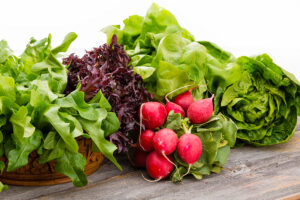Foods that May Slow Down the Progression of Dementia
 If your elderly loved one has dementia, it would be a good idea to learn more about how you can help to slow down the progression of this disease. Currently, there is no cure for the disease. However, research and studies show there are some foods that can help to slow down the progress of dementia. Keep reading here to find out what these foods are and how home care can help.
If your elderly loved one has dementia, it would be a good idea to learn more about how you can help to slow down the progression of this disease. Currently, there is no cure for the disease. However, research and studies show there are some foods that can help to slow down the progress of dementia. Keep reading here to find out what these foods are and how home care can help.
Leafy Green Vegetables
Leafy green vegetables are one of the types of foods that can help to slow down the progression of dementia. Foods such as collards, spinach, kale, and broccoli are filled with Vitamin A and Vitamin C. These foods also have plenty of other nutrients that can help with brain health.
Spices
It would also be helpful for you and home care providers to add more spices to your loved one’s diet. Spices such as cumin, sage, turmeric, and cinnamon are great for slowing down the progression of dementia. These spices reduce inflammation in the brain. They also have anti-oxidants in them which are great for brain health, too.
Omega-3s
Omega-3s are also great for slowing down the progression of dementia. Fish is one of the foods that have the most omega-3s. If you or home care providers can get your elderly loved one to eat fish one or more times every week, it can help to shield their brain from damage. While it can’t stop it completely, when it comes to the damage that dementia does, it can slow down the rate at which the damage happens.
Cherries and Berries
Cherries and berries can be great for slowing down the progression of dementia, as well. These foods have anthocyanin in them. This is something that helps stop free radicals from damaging the brain. These foods also have antioxidants and anti-inflammatory properties in them. These are also needed to help slow down the damage that is being done as a result of dementia.
Conclusion
These are some of the foods that can help to slow down the progression of dementia. While there isn’t a cure right now for dementia, there are some ways that you can help your elderly loved one to slow down the disease. Having your elderly loved one eat more of these foods is a great start. If you want, you could even have your elderly loved one see a nutritionist to come up with a healthy diet for them. A home care provider can help your senior loved one with the preparation of the foods suggested by their doctor or nutritionist.
Sources
https://www.nia.nih.gov/health/what-do-we-know-about-diet-and-prevention-alzheimers-disease
If you or an aging loved one is considering home care in South Brunswick, NJ, please contact the caring staff at Care Street Home Care today. Call (732) 607-8870.
- Signs Your Senior Parent Needs Home Care Assistance - January 17, 2025
- Hearing Rehabilitation: Empowering Seniors for Better Living - January 10, 2025
- Understanding How Cartilage Changes Over the Years - January 3, 2025
